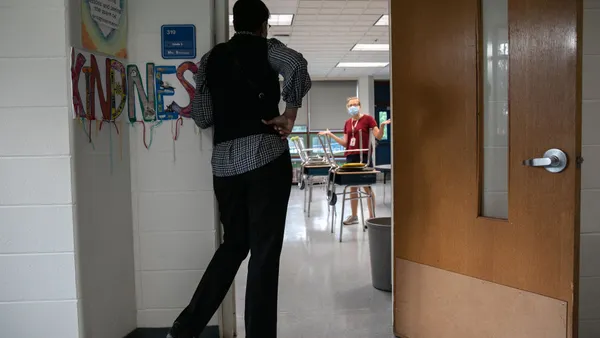PORTLAND, Ore. — For Michael Juech, assistant superintendent of operations at Howard-Suamico School District in Wisconsin, it’s important that district leaders make sure board members are educated to “look out and up” when envisioning the district’s future.
With this vision in mind, Juech shared on Wednesday how he has formed advantageous relationships with his district’s board members. Juech spoke during a session at the Association of School Business Officials International’s Annual Conference & Expo in Portland, Oregon.
Since board members are often elected officials, political ideologies may emerge. As such, it can be difficult for some members to initially trust school officials, too, Juech said.
There are board members in Juech’s district who often disagree with the state’s governor, he said. When handling such hurdles to building trust, it’s important to get board members to a comfort level by using facts.
“Let’s get the ideology out, let’s talk through those things,” Juech said.
Here are three ways Juech suggested school business officials can develop a meaningful relationship with their board members.
Help them understand school finance
School board members want to have a strong grasp on school finance, he said, but they often lack the expertise.
To help them better understand the system, district officials can provide monthly expenditure reports, arrange meetings with the school finance or business department, and hold an onboarding meeting for new school board members, Juech said.
It is important to set an agenda for these meetings with the finance department and to make sure the time is used to build relationships, he said. When these meetings are arranged, superintendents should also be informed of proceedings if they don't attend.
During onboarding, Juech said, he likes to ask about the expectations that board members and school business officials have for each other. This orientation helps the parties get to know each other better in a more informal way, he said.
Show how their decisions impact students
It’s helpful to find casual, little ways to show board members how their decisions impact students, he said.
For example, Juech's district has a $98 million referendum project that the school board is excited to be involved in, he said. So he brought some board members to the construction site.
“It built a relationship. We got to talk about it — ‘Hey, this is what you helped do,’” Juech said.
This opportunity gave board members and school business leaders the chance to reflect “on the importance and power” of how their work together helped make the referendum project possible, he said.
Visit other districts with board members
The Howard-Suamico school board also took a trip with district leaders to a Denver school system to learn about ongoing innovations happening there, Juech said. And board members were excited to go.
The trip’s goal was to inspire board members to think about their own district’s potential and future, he said.
“It refocused their work,” Juech said. “We went from talking about masks and talking about virtual learning to talking about, ‘What does the future of education look like?’”
That shift in conversation can’t happen, however, unless the groundwork has been laid to build those relationships, he said.
“If they’re informed and they’re educated, they can make true change, which ultimately impacts all of us — and more importantly, it impacts our students,” Juech said.













